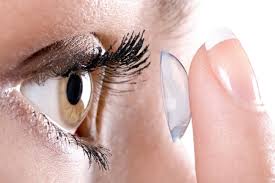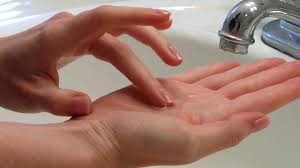Contact Lenses
چهار شنبه 8 فروردین 1397
بازدید: 1193
Contact Lenses

Almost anyone who wears spectacles can wear contact lenses, including people who require multifocal lenses. New technology means contact lenses are clearer, more comfortable and more convenient than ever; they provide a full field of unobstructed vision, freedom of movement unmatched by spectacles, additional flexibility to take on new activities with crisper vision and are also a great way to update your image.
Whether you are already a contact lens wearer, or are considering contact lenses for the first time, seek professional advice from your ophthalmologist /optometrist to ensure the correct type, fit, prescription, use and care of your lenses for your eyes and lifestyle.
Conditions correctable with lenses
A corrective contact lens is designed to improve vision. Conditions correctable with contact lenses include:
- Shortsightedness (blurred distance vision)
- Longsightedness (blurry or strained vision)
- Astigmatism (visual distortion)
- Presbyopia (blurred near vision that occurs as we age
Lens types
Soft contact lenses
- are the most commonly prescribed type of contact lenses (around 90 per cent)
- are generally comfortable to wear, easy to use and are difficult to accidentally dislodge
- correct most types of focusing errors
- can be tinted to enhance or change eye colour
- are made from flexible materials known as hydrogels, made up of part plastic and part water (silicone hydrogel lenses allow even more oxygen to pass through the lens than traditional hydrogel lenses, essential for a healthy cornea)
Soft contact lenses are suitable for people who play indoor and outdoor sports, those who don’t want to wear lenses every day and people with sensitive eyes.
Rigid contact lenses
- can provide better vision than soft lenses for certain higher or more complex prescriptions, as the optics are better controlled
- are more durable than soft lenses and do not need to be replaced as often
- may require some adaptation initially until comfort levels are achieved
- are made from plastics that are less flexible than those used for soft lenses
Rigid contact lenses are suitable for a wider range of correction for shortsightedness, longsightedness and astigmatism.
Replacement, wear and care schedules
Different lenses need to be replaced at different times, due to lenses wearing out and in order to maintain good eye health. The length of time the lens may be re-used and how to care for them depends on the type of lens.
Disposable contact lenses
Disposable lenses should be replaced according to their disposable time frame i.e. daily, weekly, two-weekly or monthly.
Disposable lenses are the most commonly prescribed and are an excellent choice health-wise because there is less opportunity for protein and bacteria to build up on them. With daily disposable contact lenses, you won’t even need to disinfect your contact lenses after each use.
Non-extended wear contact lenses
Non-extended wear lenses are applied in the morning and removed in the evening. Lenses should be cleaned and disinfected before being worn again to prevent the collection of residues (proteins and bacteria) that can cause eye infections, and for improved comfort. Lenses are usually cleaned by rubbing between the palm of one hand and a finger, using an appropriate cleaning solution. In some cases disinfection using another type of solution is also required. Your optometrist can advise the best way to clean your contact lenses.
Extended wear contact lenses
Extended wear lenses can be worn continuously (day and night) for up to a certain number of days, usually seven to 30. These lenses allow large amounts of oxygen to pass through to the eye. Only the right type of lenses may be worn while you sleep. always check with your ophthalmologist first. Extended wear contacts are not suitable for everyone; your ophthalmologist can advise if they are suitable for you.
Long wear contact lenses
Planned replacement contact lenses last one to several months. Customized soft contact lenses can last up to a year; conventional rigid contact lenses can last even longer and often only need replacing due to a change in prescription.
Novelty coloured contact lenses
Novelty coloured contact lenses are those which change the appearance of the eyes. Even though they do not contain any optical power, they should still only be supplied on presentation of a valid prescription.
After-care

Most ophthalmologists encourage contact lens wearers to have eye examinations every 12 m onths to ensure your prescription and contact lens type are still appropriate and to detect and correct problems early.
After-care appointments are a great opportunity to raise any concerns you may have about your contact lenses. Since a contact lens sits directly on the eye it increases the risk of complications such as eye infections. While serious complications of contact lens wear are rare, regular eye examinations are a good insurance policy.
Proper contact lens care is vital for your eye health. The best way to avoid infection is to follow your eye doctor's care instructions. The following are some suggestions your eye doctor will likely recommend.
- Wash, rinse, and dry hands thoroughly before handling contact lenses.
- Use soap that is free of oils, lotions, or perfumes.
- Dry hands with a lint-free towel.
- Use fingertips to handle contact lens (not fingernails and/or sharp objects like tweezers).
- Check to ensure the contact lens is moist, clean, and damage free before attempting to insert in your eye. Never put a damaged contact lens in your eye.
How to care for contact lenses is dependent on the type of contact lenses and solution recommended by your eye care professional. In addition to these tips, be sure to follow your eye care professional’s directions and package insert instructions for a successful, comfortable contact lens experience. Contact lenses should be replaced according to the schedule provided by your eye care professional. Additionally, always remember to use fresh solution when caring for your contact lenses.
دیدگاه های ارسال شده توسط شما، پس از تایید مدیر سایت در وب سایت منتشر خواهد شد.
پیام هایی که حاوی تهمت یا افترا باشد منتشر نخواهد شد.
پیام هایی که به غیر از زبان فارسی یا غیر مرتبط با خبر باشد منتشر نخواهد شد.